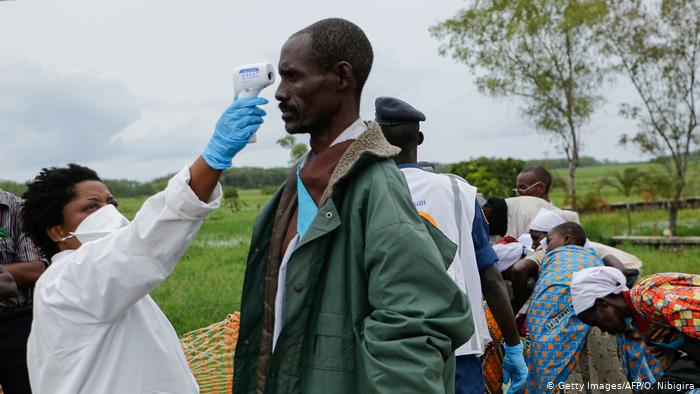
Africa has now recorded more than 100,000 infections of the novel coronavirus, the Centers for Disease Control and Prevention (CDC) said Friday.
More than 3,100 people have died from COVID-19 as the continent of some 1.3 billion people struggles to curb the outbreak, despite lockdown measures such as border closures being implemented.
Nevertheless, CDC director John Nkengasong reported that the number of cases this week was similar to the figure from last week and "we hope that trend continues," as opposed to a rapid increase.
Early lockdowns in many of Africa's countries may have prevented the disease from causing more mayhem, but Nkengasong said "that doesn't mean Africa has been spared."
He added, though, that health officials are not seeing a lot of community deaths or "massive flooding of our hospitals" due to the virus.
Coronavirus hotspots
Countries with vulnerable health care systems and a recent history of conflict, such as Somalia and South Sudan, are still a concern for health officials, particularly as the numbers continue to rise.
In Tanzania, where the president says the virus has been defeated by prayer, the government hasn't updated its numbers of cases for three weeks.
South Africa has the most infections on the continent, with more than 19,000 cases. A more aggressive testing campaign has been evident and has been cited as a reason for the higher number of infections.
WHO warning
Nine African countries saw 50% rises in registered infections over the last seven days, while others have witnessed a decline or have stable figures, the World Health Organization (WHO) reported.
The low mortality rate, currently around 3%, may be because of the continent's low median age but the WHO's Executive Director Mike Ryan said he still is concerned about the ease with which the disease will spread, particularly as there are "significant gaps" in intensive care services, medical oxygen and ventilation.
While figures on the continent as a whole remained steady, the situation from country to country shows a much greater variance, Ryan told reporters.
In the past week, four countries had an increase in cases of over 100%.
Africa has an average age of less than 20 and Ryan recognized that although the continent may have youth on its side, it "doesn't in any way reduce the chance the disease will spread." Furthermore, no one knows what impact the virus will have on millions of undernourished people and overcrowded refugee camps "so there's still a lot to be learned."
Meanwhile, the CDC's Nkengasong said testing for the novel virus should be increased tenfold in Africa. It should aim to test at least 1% of the population, or 13 million people. So far approximately 1.3 million tests have been conducted. Shortages of equipment have been cited as a significant factor.